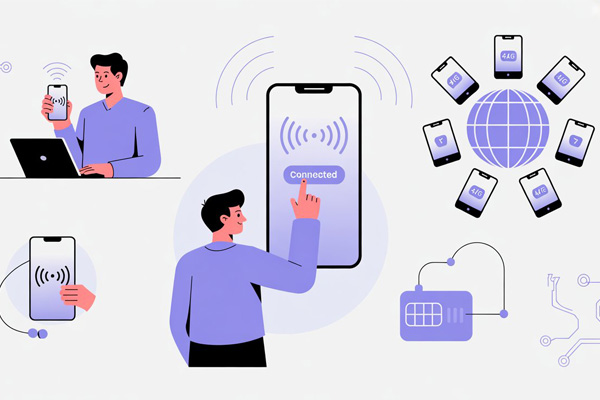Mobile Proxies: What It Is and How It Works in 2025
What Is a Mobile Proxy?
A mobile proxy routes your internet traffic through a real mobile device connected to a mobile network. By using IP addresses assigned by mobile carriers, it makes your activity appear as if it’s coming from a genuine smartphone or tablet in a specific geographic location. This setup enhances privacy, helps bypass geo-restrictions, and is especially useful for tasks requiring a high level of trust from websites—such as managing social media accounts, ad verification, or accessing location-sensitive content.

Key Aspects of Mobile Proxies
Real mobile IP addresses – Operate on genuine IPs from actual mobile devices, typically connected via 3G, 4G, or 5G networks.
Location masking – Make your traffic appear as if it’s coming from a different country or region, hiding your real location.
Enhanced privacy – Conceal your true IP address, strengthening online anonymity and data protection.
Bypassing restrictions – Overcome geo-blocks and access content or services that may be unavailable in your region.
Versatile use cases – Popular for web scraping, ad verification, mobile-specific testing, social media management, and avoiding IP bans
How They Work
Connection: You connect to a mobile proxy server.
Routing: The server sends your traffic through a mobile network, using a mobile device’s IP address.
Appearance: The destination website sees the mobile device’s IP instead of your real one.
Example: A US-based user can use a mobile proxy with a UK mobile IP to access a website available only in the UK.
Types of Mobile Proxies
3G/4G/5G proxies: Classified by the mobile network technology they use.
Rotating proxies: Automatically switch between different mobile IPs for added anonymity.
Dedicated proxies: Provide exclusive access to one mobile IP for a single user.
Why Mobile Proxies Matter in Cybersecurity
Mobile proxies play a crucial role for individuals and businesses focused on online privacy and security. By masking a user’s original IP address, they make it significantly harder for websites or tracking tools to identify the user’s true location or identity. This obfuscation ensures that web traffic cannot be directly traced back to a specific device or individual, helping maintain anonymity while browsing.
How Mobile Proxies Compare to Other Proxy Types
Mobile vs. Residential Proxies
Both mobile and residential proxies use real IPs to deliver high anonymity, but mobile proxies often outperform residential ones against advanced anti-bot systems thanks to their dynamic IP rotation and the high trust given to cellular networks.
Mobile Proxy Pros
Cellular IPs are highly trusted by most websites.
Frequent IP rotation lowers the chance of bans or blocks.
Great for accessing mobile-specific, geo-restricted content.
Mobile Proxy Cons
Higher cost due to carrier-backed IPs and constant rotation.
Can be slower than residential proxies due to cellular network speeds.
Residential Proxy Pros
More affordable for large-scale scraping tasks.
Access to a broad pool of authentic home network IPs.
Residential Proxy Cons
Static IPs risk blacklisting if overused.
Less effective against sophisticated anti-bot systems.
Mobile vs. Datacenter Proxies
Datacenter proxies, hosted on powerful servers, offer speed and low cost but are the easiest to detect since they aren’t linked to real devices or ISPs. Mobile proxies, while slower, excel at bypassing tight restrictions.
Mobile Proxy Pros
Trusted IPs from legitimate mobile carriers.
Excellent for scraping sensitive sites with strict anti-bot rules.
Mobile Proxy Cons
Slower than datacenter proxies due to mobile network reliance.
Less cost-efficient for high-volume, low-anonymity tasks.
Datacenter Proxy Pros
Extremely fast with high bandwidth capacity.
Budget-friendly for large-scale, non-sensitive scraping.
Datacenter Proxy Cons
Easily detected by advanced anti-bot measures.
Doesn’t mimic real user behavior as effectively.
Mobile vs. ISP Proxies
ISP proxies (static residential) combine datacenter speed with residential legitimacy but lack the dynamic rotation of mobile proxies.
Mobile Proxy Pros
Dynamic rotation makes every request look like it’s from a new user.
Highly trusted due to mobile carrier origins.
Mobile Proxy Cons
Higher latency compared to ISP proxies.
More expensive because mobile IPs are premium.
ISP Proxy Pros
Fixed IPs offer stable, high-speed connections.
Combine the trust of residential IPs with datacenter performance.
ISP Proxy Cons
Fixed IPs can get flagged over time.
Not as effective as mobile proxies for heavy request rotation.
Conclusion
For users seeking to access geo-restricted content or protect personal data, mobile proxies are a powerful tool. By routing traffic through multiple IP addresses from mobile devices on various cellular networks, they allow seamless access to content across regions while safeguarding anonymity. In short, mobile proxies provide a secure, privacy-focused way to browse the internet without revealing your true identity or location.
FAQs About Mobile Proxies
Are mobile proxies legal?
Yes, mobile proxies are legal in most countries when used for ethical purposes. Always follow local laws and website terms.
How are mobile proxies different from residential proxies?
Mobile proxies use IPs from mobile networks, while residential proxies use IPs from home internet connections.
Will a mobile proxy slow down my connection?
Slightly — speed depends on the proxy provider and network type, but 4G and 5G proxies are generally fast.